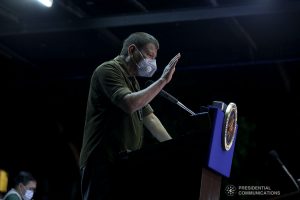Widespread opposition to the recently signed anti-terror law in the Philippines reflects deeper public dissatisfaction over the government of President Rodrigo Duterte.
Duterte signed the law on July 3, three weeks after Congress submitted the bill for his review. The Palace spokesperson claimed a legal team was first given the task of looking into the content of the bill before it was presented to the president for his signature. This was unusual since Duterte has certified it as a priority measure for his administration. What the Palace failed to mention was that the delay in the signing was caused by the surprise emergence of broad opposition against the bill in the past two months.
Congress leaders were probably taken aback by the opposition after they endorsed the bill for plenary approval in May. After all, the bill was hardly novel legislation, as it seeks to replace an existing Anti-Terror Law enacted in 2007. The bill has been pending since last year and the Senate passed it early this year without triggering an uproar from the public.
What, then, sparked concern about the law and why only now?
After Duterte imposed COVID-19 restrictions in March, he asked for emergency powers from Congress, which were granted during a special session. Duterte was given a mandate to realign funds for the faster procurement of medical supplies and the distribution of cash aid to displaced workers.
The government said its COVID-19 response was timely, effective, and compassionate, although many would dispute that characterization. Critics would cite government reluctance to conduct mass testing, the failure to provide accurate information about the pandemic, and the delayed arrival of assistance to the poor. Fourteen senators have called for the resignation of the country’s health secretary over how the government handled the COVID-19 crisis, which could easily be interpreted as an indirect indictment of Duterte’s leadership.
When Congress resumed sessions in May, it was expected to voice the sentiments of many over the lack of COVID-19 mass testing and the inadequate relief given to communities placed under lockdown. But it never demanded accountability from the president, who asked for additional funds and extra powers to deal with the pandemic. It also failed to stop a government regulator from ordering the shutdown of media giant ABS-CBN, whose franchise expired because of Congress’ inaction.
When Congress tabled the anti-terror law for deliberation after it was identified as an urgent measure for the Duterte government, the public was already reeling from the impact of the world’s longest lockdown and the economic losses caused by the pandemic. There was an expectation that Congress and the Duterte government should at least unveil a comprehensive package to serve as a guide in the country’s recovery from the COVID-19 crisis, but instead an updated law to fight terrorism was prioritized by the ruling party.
Many questioned why the anti-terror law displaced other social welfare measures that Congress could have tackled first during its one-month session.
That line of inquiry turned to anger after people began to read the provisions of the bill. No other legislation in recent memory has been as thoroughly scrutinized by as many groups, analysts, and the media. Netizens have shared infographics summarizing the draconian intent and content of the bill.
Online protests exploded, coinciding with the rise of the renewed Black Lives Matter protests in the United States, global solidarity for the movement, and the defiance of Hong Kong activists against China’s imposition of the new National Security Law. Opposition to the anti-terror law became a rallying call for advocates campaigning for human rights protection in the Philippines.
Meanwhile, the UN report on the human rights situation under the Duterte presidency was released while protests were raging against the bill already.
It is not difficult to link the passage of an anti-terror law with the possible escalation of human rights abuses. The law will be enforced by the same government that gained global notoriety for its bloody “war on drugs.”
The fear that the law will be used to silence critics was reinforced with the shutdown of ABS-CBN, the proliferation of pro-government internet trolls, and the cyber libel conviction of journalist Maria Ressa.
In several street protests, activists warned that the government will use the law to instill fear and deter people from complaining about Duterte’s leadership
Supporters of the bill accused Leftists of manipulating public opinion against the bill, but this narrative ignores the fact that the opposition comes from various sectors in society. Critics include the country’s former vice president, retired Supreme Court justices, law scholars, Catholic schools, private school owners, religious authorities, local government officials, and big business groups. These are neither the usual suspects nor the people who often publicly air their views about government policies.
The voting in Congress mirrored the divided opinion in the country as dozens in the so-called “super majority” either abstained or voted against the bill. Around 20 legislators changed their affirmative votes due to the public backlash.
On July 27, Duterte will deliver his fifth state of the nation address. His speech will probably highlight how his government responded to the COVID-19 crisis. But will he also talk about the anti-terror law and how its passage unleashed an unprecedented opposition that could pose a serious threat to his presidency?

































